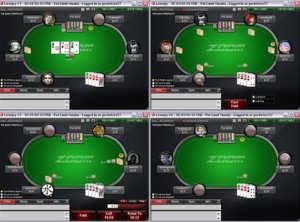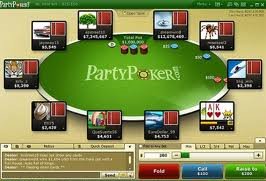U.S. Online Poker Traffic Drops 80% Since Black Friday

 According to the watchdog site PokerScout, U.S. online poker cash game traffic has decreased by 80% since Black Friday. In its weekly traffic update posted on Monday, PokerScout pointed out the large disparity between pre-Black Friday and post-Black Friday U.S. traffic: “Approximately 90% of U.S. players knocked offline by Black Friday remain offline one year later. In one fell swoop, the Justice Department succeeded in reducing the U.S. online poker market to roughly one-fifth of its previous size.”
According to the watchdog site PokerScout, U.S. online poker cash game traffic has decreased by 80% since Black Friday. In its weekly traffic update posted on Monday, PokerScout pointed out the large disparity between pre-Black Friday and post-Black Friday U.S. traffic: “Approximately 90% of U.S. players knocked offline by Black Friday remain offline one year later. In one fell swoop, the Justice Department succeeded in reducing the U.S. online poker market to roughly one-fifth of its previous size.”
On Black Friday, PokerStars, Full Tilt Poker, Absolute Poker, and UB – the four largest U.S.-facing rake-based rooms at the time – withdrew from the U.S. market after the Department of Justice indicted their owners and associated payment processors. U.S. players were sent scrambling, and many withdrew from the industry entirely, sought refuge in poker-friendly countries, or headed to brick-and-mortar casinos to play live.
What followed was a general upheaval of the industry. PokerScout described, “In the first 10 days after Black Friday, Full Tilt Poker lost 41% of its traffic and the Cereus Network dropped 53%. Market leader PokerStars fared slightly better with its more geographically diverse player base, shedding only 28%. In all, the sites lost a combined one-third of their traffic.”
PokerScout’s Dan Stewart told PocketFives in an exclusive interview why U.S. online poker traffic dropped a staggering 80%: “The players who were knocked offline were not necessarily aware there were alternatives left. Even if they were, a lot of them became gun-shy knowing that the U.S. is going to enforce the laws against U.S.-friendly sites. The players don’t want to get burned again by another enforcement action. Also, because the remaining sites are smaller, they don’t trust them as much.”
 We should point out that PocketFives does not recommend playing online poker on sites offering rake-based games in the United States right now. Your money may be at risk. We feel more comfortable recommending no-rake sites like HogWild Poker. We understand your frustration with the current situation, and that frustration is shared by all of us in the poker community.
We should point out that PocketFives does not recommend playing online poker on sites offering rake-based games in the United States right now. Your money may be at risk. We feel more comfortable recommending no-rake sites like HogWild Poker. We understand your frustration with the current situation, and that frustration is shared by all of us in the poker community.
While PokerStars refunded U.S. customers within a few days of Black Friday, Full Tilt Poker, Absolute Poker, and UB floundered. The former had its gaming license revokedand was hit with a potpourri of legal headaches, including two class-action lawsuits and allegations of being a “global Ponzi scheme.” UB and Absolute Poker have been largely mute, while Full Tilt is reportedly in the final stages of a sale to Groupe Bernard Tapie.
PokerScout revealed that in the waning days of June, when Full Tilt’s gaming license was suspended, 50% of the room’s non-U.S. players fled to other sites. However, according to PokerScout, “While PokerStars remains 12% ahead of where it stood after Black Friday, that increase came primarily at the expense of existing competitors. Full Tilt’s rest-of-world players effectively vanished into thin air.”
 PokerScout, which keeps tabs on cash game traffic, claimed in its weekly update that online poker traffic could be shrinking by as much as 10% annually, and compared to the week before Black Friday, real money ring game traffic has dipped 32%. PokerStars’ cash game traffic is off 13% year-over-year, while PartyPoker, which left the U.S. market in 2006, has had its traffic drop 4% year-over-year. Full Tilt’s felts are idle, while the Cereus Network’s traffic has nearly completely dried up.
PokerScout, which keeps tabs on cash game traffic, claimed in its weekly update that online poker traffic could be shrinking by as much as 10% annually, and compared to the week before Black Friday, real money ring game traffic has dipped 32%. PokerStars’ cash game traffic is off 13% year-over-year, while PartyPoker, which left the U.S. market in 2006, has had its traffic drop 4% year-over-year. Full Tilt’s felts are idle, while the Cereus Network’s traffic has nearly completely dried up.
Several networks have seen noticeable gains over the last 52 weeks. Traffic on the Merge Gaming Network has nearly doubled, while 888 Poker‘s cash game traffic is up 56%. The iPoker Network’s real money ring game player counts are up 4% year-over-year, while Winamax.fr has turned in a strong showing at +46%.
Check out online poker players’ Black Friday Tweets.




